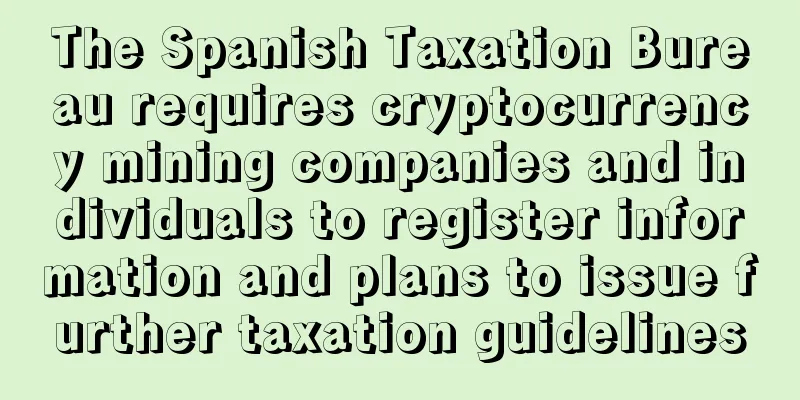The Spanish Taxation Bureau requires cryptocurrency mining companies and individuals to register information and plans to issue further taxation guidelines

|
There is very little regulation on the cryptocurrency mining industry. Most countries have not yet introduced any regulations on this, but the Spanish tax authorities have defined Bitcoin and altcoin mining operations as economic activities. This new industry classification means that cryptocurrency mining companies will face taxation issues. The Spanish National Tax Service (NDTS) recently issued an announcement requiring Bitcoin and altcoin mining companies (including individuals) to register information. Regardless of whether it is conducive to legalizing the cryptocurrency mining industry, this move by the tax office will definitely affect the income of mining companies. Therefore, it is likely to cause some miners to quit. Spanish economist and tax consultant Jose Antonio Bravo Mateu estimates that mining operators may eventually need to pay profits taxes ranging
In order to maintain their mining profits, miners must constantly update their equipment. The continuous increase in mining difficulty will inevitably lead to increased power consumption. In this case, it is unclear whether various forms of tax relief will still be beneficial to ensure mining profits. The Spanish government said that the new regulation was introduced to combat illegal digital currency activities. As the above policy is gradually implemented, the Spanish cryptocurrency community has also expressed concerns about whether this tax regulation will affect the innovation and development of blockchain technology. In addition, the new taxation rules introduced by Spain are likely to affect other EU members or Latin American countries, and it is inevitable that some people will follow suit. Spain has always been very tolerant of the cryptocurrency economy and is the first European country to exempt cryptocurrency transactions from value-added tax (VAT). Whether this new taxation rule can guarantee its good reputation in the cryptocurrency community remains to be seen. |
>>: Blockchain database startup BigchainDB raises €3 million
Recommend
What does Ziwei Ming Palace represent?
In ancient times, the emperor was the supreme rul...
Kusama slot auction star storage project Crust Network teaches you how to create value with your data!
AMA Topic: Kusama slot auction star storage proje...
How to see villains in the workplace
The most taboo thing when working in the workplac...
What kind of people can't date?
Each of us will have this feeling. When we meet s...
Palmistry diagram: how to tell the fate of children through the children line
Palmistry diagram: how to tell the fate of childr...
Institutional landscape of Bitcoin investment: Spending 260 million to stockpile Bitcoin and Ethereum? Meitu has three "back-ups"
Original source: OKLink Bitcoin "institution...
A broken lifeline in palmistry indicates a shallow relationship with the elders
What does a broken lifeline in palmistry mean? Th...
Is it important to have a good-looking nose?
Is it important to have a good-looking nose? 1. S...
12 types of teeth determine your life
1. People with big front teeth are active and hav...
What if a woman has a mole between her eyebrows?
In daily life, we can find that almost everyone h...
ACH first mine unveiled
This article was provided by Zhang from Playing M...
What are the characteristics of women who are vain and those who despise the poor and love the rich?
It is actually human nature to seek profit and av...
What does a man with a mole on the sole of his foot mean?
Many friends find moles on the soles of their fee...
The face of a hypocritical and indistinguishable person
If a person can be hypocritical all his life, the...
What does it mean if a woman has a mole on her eyebrow?
Eyebrows are known as the longevity guardian and ...









